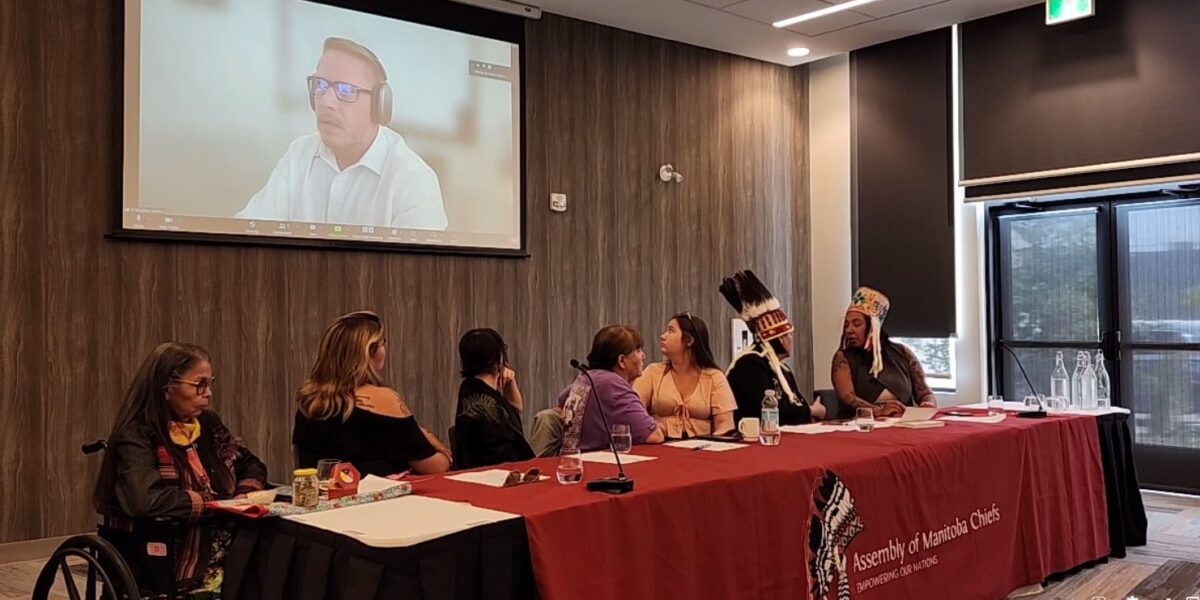Content warning: The following story contains details of Missing and Murdered Indigenous Women and Girls. Individuals impacted by the issue of Missing and Murdered Indigenous Women and Girls can contact the MMIWG Crisis Line toll-free at 1-844-413-6649.
Heather Stefenson’s Manitoba government continues to reject any possibility of a search for victims of a serial killer, whose bodies were disposed of in a local landfill – despite calls from Indigenous communities, the federal government, and even the United Church.
The victims, Morgan Harris, Marcedes Myran and Mashkode Bizhiki’ikwe (Buffalo Woman), were killed in 2022. But because of their Indigeneity, their remains are little more than an afterthought for Stefenson.
At least, that is the message the government is sending to Indigenous people: that Canada will only search for you if it is not too complicated.
More dangerously, the failure to exhaust every resource to find the victims sends a stark message to white supremacists that you can get away with murder.
If it seems cruel and unusual, it is because it is.
But it’s nothing new for Indigenous women, children and gender-diverse individuals. They are the subjects of an ongoing genocide by Canada, and an epidemic of murder and missing persons cases. The cases remain unsolved, let alone adequately investigated.
Rejecting a search could impact Manitobans’ mental health
On Thursday, the Manitoba Missing and Murdered Indigenous Women, Girls, Two Spirit, and Gender-Diverse People (MMIWG2S+) Implementation Committee called on all levels of government to “implement disaster management protocols and begin an immediate search” of the landfill.
The committee is also known as Giganawenimaanaanig, which translates to “we all take care of them.”
Instead of a search, the province has offered memory and health care support. This is “not adequate or an appropriate substitute,” said committee spokesperson Sandra Delaronde in a statement.
The province’s refusal to conduct a search furthermore contradicts a federally-funded study concluding that a search of the landfill would be feasible. The federal government is also on board. Even the union representing employees who work at the landfill have said publicly there is no reason a search could not be done with the appropriate safety precautions.
As an act of resistance against the province’s refusal to search the landfill, supporters set up a blockade near the facility on July 6. But as Scott Martin reported for rabble.ca, a court injunction was issued on July 14 to end the blockade, and it was ultimately torn down on July 18.
A continued refusal to search the landfill “will have severe and long-term mental health risks to all Manitobans,” argues the committee, which will disproportionately impact Indigenous women, children and gender-diverse individuals.
“Missing women deserve to be laid to rest according to the traditions of their people. These are fundamental obligations of justice,” Delaronde said. “In the context of the history of colonialism, and the grave violation of Indigenous women’s right to safety, it is especially important that these obligations are fulfilled.”
Indigenous leaders continue to speak out
On Monday, the Assembly of Manitoba Chiefs (AMC) and Long Plain First Nation (LPFN) released a joint statement expressing their continued disappointment “with the delay by all levels of government to provide support” to search the landfill.
AMC Grand Chief Cathy Merrick criticized the provincial government’s dismissal of the feasibility report. The government is now “citing safety concerns without providing specific details to validate them and the impact such a search would have on the prosecution of the accused,” she said.
“Taking no action at all is not an acceptable option,” Merrick concluded.
Chief Kyra Wilson of Long Plain First Nation shares Merrick’s concerns.
“This latest provincial response is deeply concerning as it leaves affected families in an unfortunate dilemma: they must choose between pursuing justice in court or advocating for the search and recovery of their loved ones,” Wilson said in a statement.
Wilson pointed out the failure of government directly violates calls to justice outlined in the National Inquiry into Missing and Murdered Indigenous Women and Girls.
Ultimately, while Wilson wants to see the perpetrator face justice, what is most important is finding the victims’ remains and have them returned home with respect and dignity.
On Wednesday, Gary Anandasangaree replaced Marc Miller as federal Minister of Crown-Indigenous Relations. Miller had supported calls to search the landfill and called Stefenson’s refusal to do so “heartless.”
In a statement, Merrick expressed hope that the new minister can “assist us in bringing back our loved ones,” but said the shuffle resulted in “the loss of an advocate.”
United Church calls rejection by province ‘an act of racism’
Support to search the landfill only continues to grow, with the United Church of Canada joining calls to take action.
In a July 21 news release, the United Church noted the rejection by Stefenson and other officials “has emboldened others to commit racist acts.”
“Landfill searches for non-Indigenous murder victims have been successfully undertaken in the past, yet Manitoba remains unwilling to act in this case,” the United Church said. “This is an act of racism, and demonstrates a lack of humanity.”
The bottom line
Just weeks ago, Canada spent at least $2.4 million searching for five people — including a billionaire — aboard a submersible bound for the site of the ill-fated Titanic. It is inhumane that one tragedy is deemed to spare no expense while another is given up on without even trying.
Reconciliation is not easy, but doing the right thing should not be this hard.



